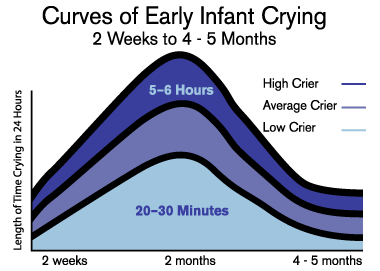The weird things babies do that no-one warns you about
Babies can do lots terrifying things. And that is just the normal ones.
During a quieter shift in the children’s emergency department, I took the opportunity to teach some of our GP trainees. They had quite a lot of anxiety around knowing what is normal or not normal for little babies. This is appropriate anxiety, because they will see a lot (and I mean, a lot!) of little babies in general practice. What’s more, it is not always completely obvious what exactly is or is not normal about some of the stuff they do!
Here is my top list of the things that little babies do that seem like they are not normal, or shouldn’t be normal, but are usually completely normal.
Stopping breathing
This may sound dramatic, and obviously I do not mean stopping breathing completely - that is not normal. It is however completely normal for babies to have frighteningly long pauses in their breathing patterns.
This is because newborn babies have an immature respiratory centre in their brainstem (which controls automatic breathing reflexes), and they fall into a pattern we call “periodic breathing”.
An adult will breath roughly 12 breaths per minute, with equal durations between breaths. Newborns will breath very erratically. They will have long pauses (up to 10 seconds), then make up for this by breathing very quickly for a period afterwards.
Obviously, this is absolutely terrifying when you have your first baby and no one tells you about it (Tim Minchin does a good impression - colourful language warning).
We only tend to consider pauses in breathing to be pathological when they last longer than 20 seconds, or are associated with change in colour, tone, or reduced responsiveness, at which point we call them an apnoea.
Crying all the time
A common reason why babies are brought to a doctor is because they will not stop crying. Parents are at the end of their tether. They haven’t slept for days, and are concerned that this cannot be normal. If the baby is not asleep, being held, or being fed, it cries constantly.
I am very sorry to have to tell them, this is almost certainly completely normal, and there is nothing we can do about it.
The normal course (if there is such a thing) for most babies, is that for the first 2 weeks of their life they only wake up to feed, then go back to sleep. You will often hear parents say , “we’re lucky really, they seem very settled!”. Little do they know.
Around 2 weeks in, the baby starts to wake up. And they cry. And cry.
Crying then usually intensifies from this point up to between 8 and 12 weeks of age - the period we refer to as “peak crying”. The crying is worse in the evenings between 5 and 10pm (often colourfully referred to as “the witching hours”).

There is a normal range of crying for babies. Some babies will almost never cry at all (these parents are very smug). Some babies will cry the entire time they are awake unless they are being fed, or being held. This is usually completely normal.
That is not to say it is easy! In fact this can be one of the most challenging times of a parents entire life, and most of our interventions as health professionals are around providing support mechanisms for parents whilst they endure this difficult period.
If the baby settles when held, is growing normally, and has no other features of illness, then crying alone is not considered a problem.
Two of the best websites for information and support on baby crying are ICON (UK based) and PURPLE crying (US based).
You may have heard the term “colic” used, which I will discuss at the end.
Reflux
Often referred to as vomiting, sicking, or spitting; reflux is the effortless regurgitation of milk from the stomach into the oesophagus (and often out of the mouth and down your shirt). Reflux is ubiquitous in infancy, meaning 100% of babies will reflux to some extent. This is because the junction between the stomach and oesophagus is much looser in babies and their diet is completely liquid.
As reflux is ubiquitous, it very rarely causes any medical problems. It can be problematic when it is very large volumes, as changing your baby 10 - 15 times a day because they are covered in milk is very difficult to sustain. In very rare, exceptional cases, very large volume reflux can inhibit growth as babies cannot keep enough milk down to digest. Also extremely rarely, some babies might have overly acidic stomach secretions which cause inflammation of the oesophagus.
The problem is that reflux gets blamed for everything. Most frequently, reflux gets blamed for crying. Babies arch their backs or curl their tummy, and their parents think this indicates stomach pain. The reality is that this is simply the normal way for most babies to cry, and is not an indicator of any tummy problems.
The reason this is a problem is that doctors might prescribe anti-acid medications. This is almost always a mistake. Firstly, very few babies have acid reflux (all they drink is milk which is alkali). Second, anti-acid medication does nothing to actually prevent the milk from refluxing. Third, there is increasing evidence that anti-acid medications in infancy increase the risk of later life allergic or inflammatory or conditions. This is because the reduced acidity in the stomach allows bugs to grow in the bowel which normally would not. This alters the normal flora (microbiome) of the gut which is important in training the immature immune system in what is friend and what is foe.
There have been big strides to try to stop people prescribing medicines such as ranitidine or omeprazole to babies over the past few years. Where reflux is truly problematic, the best treatment is to give smaller, more frequent feeds. This is the most effective way of reducing the volume of reflux. Additionally, thickeners such as “stay down” formula, or infant gaviscon can be used, however these often cause constipation which can be more problematic than the reflux.
In most cases, the reflux is not the problem. Even when it is, reflux abates by itself usually around 5 to 6 months of age when babies begin to sit upright and eat solid food.
Note - reflux is medically different what we call vomiting, which is the forceful ejection of stomach contents. Sporadic vomits can be normal for babies, but frequent vomiting is more likely to be a sign of a problem.
What is Colic?
Colic is not really anything. Medically speaking, Colic was a term coined to describe frequent crying - crying for more than 3 hours a day, for more than 3 days a week, for at least 1 week. The problem with this term, is it sounds like it is describing a problem. Colic is also a medical term used to describe a cramping pain, usually associated with the bowel. It is easy to see how this can cause so much confusion, when it is a medical type term being used to describe a normal amount of crying.
As it sounds like a medical problem, parents often seek medical solutions. Colic then gets muddled up with lots of different problems, such as reflux (as discussed above), and dyschezia (when babies strain and get upset before pooing or passing wind). Both of these things are actually normal for babies and require no treatment, but get blamed when the baby also cries the rest of the time.
In my opinion the term “colic” should be discarded completely, as it is both superfluous and merely confusing for parents and health professionals alike.
Summary
Pauses in breathing, effortless regurgitation of milk, and crying all the time unless sleeping, being held, or feeding can all be completely normal for a small baby. Unless they are associated with other signs, they normally do not require any investigation or treatment. That doesn’t mean that they aren’t scary, distressing or difficult to manage for the parents! The most important job for health providers after ensuring there are no other signs of pathology, is to give thorough explanations to parents about what is happening and why, to give them hope that it will end (!), and to provide them with support and coping mechanisms to get through the tricky infant period.
This too will pass.





How about "night terrors"? Kid looks at you, screaming, eyes open, otherwise completely unresponsive. "Growing pains?" I know, they don't exist (as such). But our daughter would wake up screaming with terrible pain in her legs. We tried everything to soothe her. She turns 27 next week, and claims to remember the pain, which continued until she was 3 or 4. Crying? It wasn't always practical to put her in the car and drive around aimlessly. I'd put her in the sling, and walk laps around the block. I had a patient from Barbados who swore that "Gripe water" was the answer. Scarier still was that one day while walking around our block with L in the sling, the helpful Armenian family sitting out on the stoop told me that a surefire cure was to soak a large cotton ball in alcohol and set it aflame on top of my daughter's abdomen.
I didn't try either cure.
I wish I had read this before we had our first! Our daughter used to vomit 10-20 times a day from about 6 weeks to 9 months of age. It was not effortless, it was not painless, it was large volumes of what looked like curdled milk. Her doctors ruled out stenosis of the esophagus and so decided it was “just reflux”. We treated her with increasing doses of Pepcid for 9 months, before we finally discovered she had a milk protein allergy. Once we cut out milk from her diet (and mine due to breastfeeding), she stopped vomiting completely. We still feel so, so bad that she spent months and months taking a medication that not only didn’t help, but may actually cause harm.